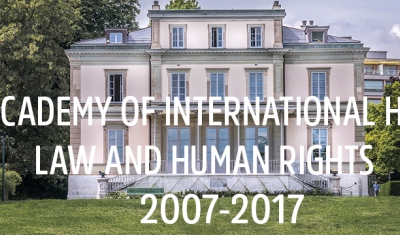International Criminal Law: General Principles and International Crimes


ICC-CPI
Descriptive
International criminal law has developed dramatically since the early 1990s, and now consists of a complex system involving national courts with international participation, alternative transitional justice mechanisms like truth commissions, and temporary or ad hoc international courts. The International Criminal Court sits at the centre of this.
This online short course reviews the origins of international criminal law, its relationship with the international legal order including the UN Security Council and its coexistence with national justice institutions. The scope of international crimes – genocide, crimes against humanity, war crimes and the crime of aggression – is considered alongside initiatives to expand or add to these categories.
Online
This is an online short course.
Schedule
Classes will take place online during lunchtime on:
- Tuesday, 5 November 2024, 12:00–14:00 (CET)
- Thursday, 7 November 2024, 12:00–14:00 (CET)
- Thursday, 21 November 2024, 12:00–14:00 (CET)
- Friday, 22 November 2024, 12:00–14:00 (CET)
- Thursday, 28 November 2024, 12:00–14:00 (CET)
- Friday, 29 November 2024, 12:00–14:00 (CET)
Audience
This short course forms part of the Geneva Academy Executive Master in International Law in Armed Conflict. It is open to professionals – diplomats, lawyers, legal advisers, judges, NGO staff, human rights advocates, media specialists, professionals working in emergency situations, UN staff and staff from other international organizations – who are not enrolled in the Executive Master and who want to deepen their expertise in this specific issue.
Fee
The fee for this short course is 1,250 Swiss Francs. In case of cancellation by the participants, CHF 200 won't be returned.
Certificate
Participants obtain a certificate at the end of the course (no ECTS credits are gained).
How to Apply
Applications must be submitted via this online form.
Your application will have to include:
- A short motivation letter (no more than one page)
- Your curriculum vitae
- Proof of your competence in English (a certificate or statement highlighting your solid background in English)
- Once admitted to the course, participants receive instructions on how to pay. Proof of payment is required before you begin the course.








